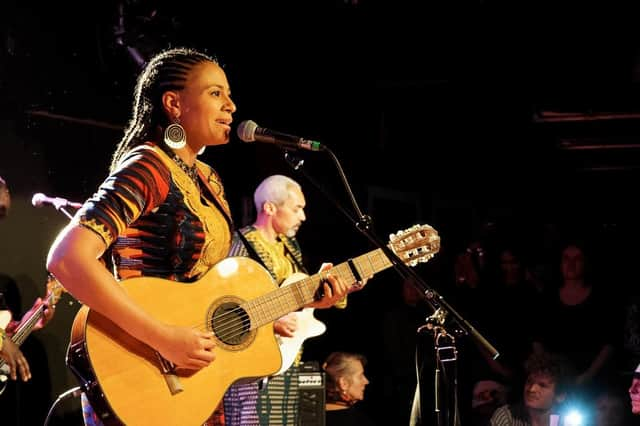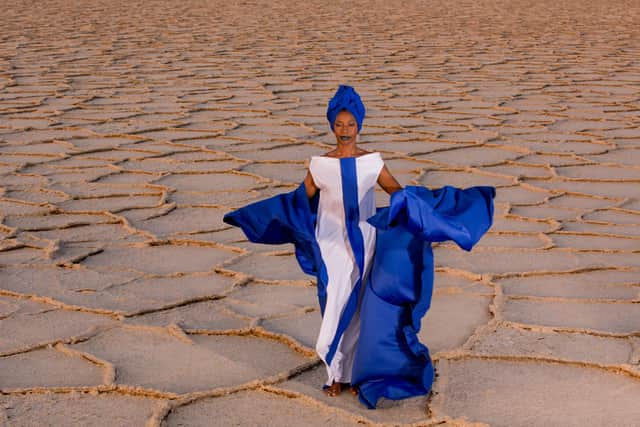Thinking globally: How the EIF brings the world to Edinburgh


The Edinburgh International Festival has always been international, and overtly described as such. The cover of the souvenir programme from its inaugural event proudly declares “The International Festival of Music and Drama, Edinburgh, 1947.” Over the last 74 years, however, the meaning of that adjective has shifted and expanded – and, in 2021, the festival’s programme represents a more sophisticated, nuanced understanding of internationalism. Sona Jobarteh and Fatoumata Diawara – two musicians with roots in both Africa and Europe who appear this year – exemplify what’s perhaps a more elusive but also more inclusive idea of internationalism, one that the festival has increasingly embraced in recent years.
Back in 1947, the festival’s underlying aims were about healing the wounds of war through the unifying power of art, and the very act of welcoming artists from countries that had been bitter enemies less than two years earlier – not without its controversies – played a major role in those intentions. “It’s worth remembering that there was a raging debate at the time,” explains current Edinburgh International Festival director Fergus Linehan, “about whether it should be a festival of Britain, or a festival of Scotland and Britain in the world, before it was settled on as an international festival. I’m no anthropologist or sociologist, but I think there was a need for celebrations that were ecumenical and not nationally based, and one thing we could rally around was art.”
Advertisement
Hide AdAdvertisement
Hide AdNonetheless, perhaps inevitably, the festival’s early focus was international in a relatively local sense: “Greek drama, or Beethoven and Brahms, or Shakespeare – part of a European culture we all shared,” in Linehan’s words, though soloists and orchestras from the then Eastern Bloc soon expanded the programme’s overseas reach. Within its first decade, however, the net was cast far further. The Azuma Kabuki Dancers and Musicians from Japan visited in 1955, the Ram Gopal Indian Ballet in 1956, and the Ballets Africains de Keïta Fodéba from Guinea in 1957. China and Latin America, however, had to wait until 1979 for representation, in a Queen’s Hall recital simply titled “Music from China” for the former, and in a visit from the National Ballet of Cuba for the latter.


The festival, then, could fulfil its international objectives by simply inviting artists from increasingly far-flung countries. But is it as simple as that? Linehan feels that connotations surrounding the idea of internationalism itself have themselves shifted hugely in recent years. “In the late 1990s and early 2000s, there was a sense of an opening up of the world, and it was all seen very optimistically," he says. “That’s now tainted, I think, and in some quarters internationalism is seen as part of a global neoliberal project: a few generations later, there might be a lot more suspicion about the idea.”
It’s also become increasingly problematic simply to programme performers in the expectation that they represent unfamiliar, even "pure” traditions, while disregarding the interpenetration between cultures, the ceaseless hybridisation across music, theatre, dance and all the other arts that’s been going on for centuries. “There wasn’t much discussion of diaspora, either,” Linehan continues. “I think our idea of the world now is as much to do with the internationalism that exists within our own country. There are some artists who can offer a global perspective from wherever they happen to be.”
Sona Jobarteh has performed in Scotland once before, she remembers, and says she was struck by the pride that Scots took in their own music and culture, and the openness they therefore felt towards hers. Born in London, she comes from eminent West African musical lineage: her cousin is Toumani Diabaté, one of today’s most celebrated players of the kora or West African lute/harp, and her brother is fellow kora player and composer Tunde Jegede. Accordingly, she brings a distinctly personal perspective on traditional songs from the Gambia, though she began her studies on cello, piano and composition at London’s Royal College of Music and Purcell School, before asking her father, Sanjally Jobarteh, to pass on his expertise on the kora. “It was a unique opportunity to understand both classical traditions,” she explains, “but there was a total separation between the two musics, and I adopted completely different personalities to be able to maintain those two sides in parallel. It was only later that I began to see they could coexist.”
She’s the first professional female kora player from one of the main West African families of griot singers/musicians/storytellers – an undeniably significant position to be in, though not one Jobarteh feels entirely comfortable with. “I resented being labelled like that at first. It’s as though I had to pretend it was all about being a woman, when I was a musician like every other member of my family, and that’s all I wanted to be. When I asked my dad if he would teach me the kora, he said yes, but I’m teaching you not as a girl but as a musician, as my child who’s going to take on this tradition. I think that gave me the confidence to think I could do this, and my gender didn’t have to be a hindrance.”
Indeed, balancing respect for tradition with a passion for innovation is key to Jobarteh’s music. “Tradition is not and has never been static, especially the griot tradition,” she explains. “Not so long ago, the kora was a completely modern innovation, but now it’s considered a traditional instrument. We can look back on hundreds of years of tradition in West African music, and it is constantly adapting to survive. We’re still telling the stories, singing the songs, paying homage to ancient history. But it’s an evolution: I’m trying to push the survival of the tradition rather than break the tradition.”
Similarly, singer and guitarist Fatoumata Diawara shared her early life between France and Mali, and began her career in acting before turning to music. “I actually started as a dancer,” she explains. “From when I was a baby, it was my first way to express myself. My aunt was an actress and invited me to be in one of her productions, and the director saw me and asked me to be involved in a movie. The similarity between acting and singing is that the voice cannot lie. I’m totally exposed when I’m on stage, and I want the audience to feel my personality, my history, my ancestry.”
Advertisement
Hide AdAdvertisement
Hide AdDiawara now lives in Italy, but performs internationally, and has released two acclaimed albums of her original songs, the earthy Fatou in 2011, and the more dance-heavy Fenfo in 2018. “Having lived in both Mali and France, and working with many different artists across different styles of music have given me lots of experiences, which you can hear in my music. It’s not just Malian music – it’s a mix of everything. It doesn’t need to be defined by boundaries or countries or colours.”
Both women draw on West African traditions in their music, but expand them in new directions. Both feel, too, that it’s crucial that Western festivals and venues maintain a broad perspective, not only bringing in international performers but also embracing styles that might be unfamiliar, or that straddle or develop cultures anew. “Here in the UK,” says Jobarteh, “some big arts venues and events used to have a very particular and quite conservative audience, but we’ve seen it completely turn around. For many international artists, those are now the first places they think of coming to. I think, again, it’s about bringing tradition to a new phase. It’s about moving away from seeing innovation and change as a break with tradition, and instead moving into what’s relevant, and keeping up with your audience’s interest and passion for music.”
Indeed, both at the Edinburgh International Festival and elsewhere throughout Europe, there’s been a noticeable shift towards embracing a broader, subtler, more sophisticated view of the international. There’s another perspective on internationalism, however, that’s become increasingly prominent among certain sections of UK society in the past five years. Rather than celebrating our connections to and passions for other cultures, and the ways they’ve always enriched our own country, shouldn’t we be directing our attention instead to the glorious achievements and illustrious history of Great Britain itself? If the Edinburgh International Festival is to remain resolutely apolitical, how does it react when one of its founding values, a concept that many of us long took for granted, is suddenly contested?
“I think the idea of being completely apolitical now is a luxury that’s not open to anybody – it doesn’t matter if you’re running a restaurant or a festival,” says Linehan. “There are issues that are so urgent in society that distancing yourself from them, or not taking a position on them, is a kind of moral abdication. You can’t say, for example, we’re apolitical on environmental sustainability. And even if we imagine internationalism to have been a universally held view, perhaps it was always more radical than that. And perhaps we were always more overtly political than we allowed ourselves to think.”
Sona Jobarteh, Edinburgh Academy Junior School, 26 August; Fatoumata Diawara, Edinburgh Park, 27 August. For full programme details, visit www.eif.co.uk
A message from the Editor
Thank you for reading this article. We're more reliant on your support than ever as the shift in consumer habits brought about by coronavirus impacts our advertisers.
If you haven't already, please consider supporting our trusted, fact-checked journalism by taking out a digital subscription at https://www.scotsman.com/subscriptions